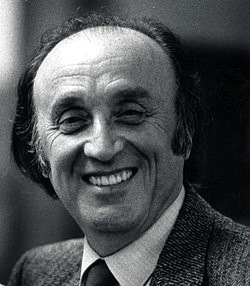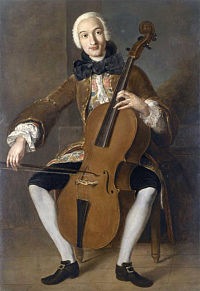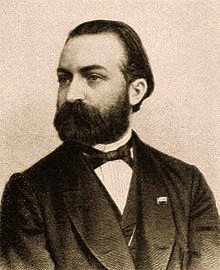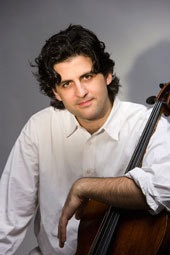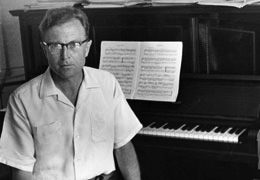The Well-Tempered Ear
Classical music review: The Wisconsin Chamber Orchestra and cellist Amit Peled triumph with Mark Kopytman’s rarely heard “Kaddish” and Haydn’s “Military” Symphony.
3 Comments
By Jacob Stockinger
When my mom made sandwiches for us, she would always say, “You take the bigger half.”
The same Law of Unequal Halves was at work at Friday night’s concert in the Overture Center‘s Capitol Theater by the Wisconsin Chamber Orchestra (below) with the Israeli-born cellist Amit Peled.
Overall, it was a terrific concert, one more event to cement the WCO’s reputation as a music-maker not to be missed. But yes, I’ll take the bigger half. And for me that was the second half.
It opened with an absolutely riveting performance concerto-like “Kaddish” of the late Russian-Israeli composer Mark Kopytman (below):
In this little known and rarely performed 20th century work, Peled (below) excelled. His solo cello played the part of the eldest son reciting the Jewish prayer for the dead while the orchestra played the part of the father.
The two dialogued back and forth, complete with agreement and disagreement, consonance and dissonance. Towards the end comes a stunning contrapuntal cadenza – reminiscent of Bach’s solo cello suites – in which the solo cello took on both parts, one high and the other low.
It was an emotionally wrenching journey for both performers and listeners – and already I think of it as a highlight of the current season and the new year. Not often to we get to hear new music – or music new to us – that is so compelling in a performance that is so convincing.
Then came the concert’s closer: Haydn’s Symphony No. 100, “Military.”
It is one of the last London symphonies of Papa Haydn and the WCO showed its stuff — its fine, big, precise sound.
All sections performed under the baton of WCO music director Andrew Sewell (below) with an accuracy and briskness that lived up to the martial nickname of the symphony. But special mention has to be made of the percussion, brass and wind sections that added that special seasoning and zest to the piece.
The WCO’s last recording was an outstanding 2-CD set of Mozart’s piano concertos and symphonies. I think the WCO’s Haydn is at such a high level where it should be the ensemble’s next project: Perhaps a 2-CD set of Haydn, a symphony sampler if you will, with perhaps an early or middle-period Storm-and-Stress symphony (perhaps the popular “Farewell” Symphony No. 45) , then maybe one of the Paris symphonies (the “Bear” or “Queen”; and finally one or two of the final London symphonies (the ”Miracle” or “Drumroll” or “Surprise”).
Anyway, with 104 symphonies to choose from, Haydn’s music offers riches galore that play to the strength of the WCO for many a season to come.
The concert started with another piece of relatively “new” music – the “Diversions for String Orchestra” – by Douglas Lilburn (below), who, like Sewell, hailed from New Zealand and went to Great Britain to study under Ralph Vaughan Williams. (By the way, Sewell pronounced it Ralph, not the trendy Raiph. Thank you, maestro.)
“Diversions” is not great or unforgettable music, but it is a perfect curtain-raiser. It is, by turns, perky, jaunty and lyrical; and it goes down easy. The Brits do pastoral and landscape the way the Russians do soul and suffering and the French do elegance and sensuality.
The major disappointment for me was unexpected: the Cello Concerto in B-flat by the virtuoso cellist and composer Luigi Boccherini (below). Boccherini lives on forever in the shadows of other Classical-era giants Mozart and Haydn. But his works unquestionably deserve a major rediscovery.
It is just too bad that Peled chose the most famous and most played of Boccherini’s 13 cello concertos, the one reworked by the 19th-century Romantic cello virtuoso Friedrich Gruetzmacher (below).
The playing by the both the orchestra and the soloist was first-rate, and the work has both beautiful and dramatic movements. But I found the revised orchestration too thick, too rich, too heavy, too muddy – a little like the way Mahler re-scored Beethoven’s symphonies.
Of course it is a matter of personal taste, and local critics remain divided. One critic, John W. Barker, shares my preference for the original. Here is a link to Barker’s review in Isthmus:
http://www.thedailypage.com/daily/article.php?article=35701&sid=3744f7c14aa4a059da80a3502e6cfd4b
Other critics, like Lindsay Christians of The Capital Times and 77 Square, and William R. Wineke of WISC TV’s Channel 3000, disagree. Here is a link to Christians’ review:
And here is a link to Wineke’s review for Channel 3000:
http://www.channel3000.com/entertainment/30213725/detail.html
Two critics who spoke in person to me were also divided: Greg Hettmansberger of Madison Magazine liked the revised Boccherini; Michael Muckian of Brava magazine didn’t.
Here is a link to Greg Hettmansberger’s review:
Nonetheless, I wanted the yellow waxy build-up of Romanticism to disappear so I could hear the true Boccherini and his Classical-era clarity and transparency, without misdirected and so-called help, even on modern versus period instruments. I would love Peled (below) to return to Madison and to the WCO with another Boccherini concerto, but this time with the genuine article.
My other minor disappointment is that neither Sewell not Peled seemed to milk the audience enough, despite standing ovations. Lights came up too quickly; applause was cut off prematurely. Too bad. Great performing artists also play the audience. We want to tell them how much we like them – and hear how much they like us.
True, the program was long, and there were CD’s to be sold and signed after the concert. And true, it was a cold and snowy night.
But Peled, a soloist who cuts an impressive figure – the tall, big-handed man performed in a blue Russian Cossack shirt — missed a perfect opportunity by not offering an encore.
It could have come just before intermission, right after the Boccherini.
But honestly, a short and bright movement – say a dance movement from one of Bach’s solo cello suites – would have been perfect after the Shostakovich-like darkness and heaviness of Kopytman’s “Kaddish” and great transition or set-up for Haydn’s symphony.
Why be stingy with your gifts? Plus, it is good public relations for both the soloist and the ensemble. I think audiences feel treated special when they are given more than they bargained or paid for, when the soloist or even the ensemble tips a hat to them by offering a little something extra, a bonus.
Maybe next time.
And in Peled’s case, I do hope there is a next time.
Soon.
Classical music Q&A: It is time to rediscover composer Luigi Boccherini, says acclaimed cellist Amit Peled, who on Friday night will perform with the Wisconsin Chamber Orchestra, which he calls “one of the best chamber orchestras in the U.S.”
Leave a Comment
UPDATE: The FREE astronomy program this Saturday at the UW Space Place about the Madison Opera‘s production of Philip Glass’ “Galileo” has now been filled. I posted about the program on Monday, if you want to read about it.
By Jacob Stockinger
That is when the Wisconsin Chamber Orchestra will perform a program of Classical and modern music under the baton of WCO music director Andrew Sewell.
Tickets are $15-$62. Call the Overture Center box office at 608 258-4141. For more information about the program and tickets, visit:
http://www.wcoconcerts.org/performances/masterworks/26/event-info/
The program is classic Sewell (below), who likes to mix it up and introduce the audience to new works they probably don’t know as well give them a chance to hear a familiar work or composer they love.
This program features a well-known masterpiece, the Symphony No. 100 (“Military”) by Hadyn, one of Sewell’s specialties for which he has been praised. There will also be a work, “Diversions for Sttring Orchestra,” by the 20th century composer Douglas Lilburn (below, 1915-2001) who, like Sewell, hailed from New Zealand.
The program also features an unknown work, “Kaddish,” based on the Hebrew service for the dead – a kind of Jewish requiem – for cello and strings by the little known contemporary Russian-Israeli composer Mark Kopytman (1929-2011).
And there will be a Cello Concerto by Luigi Boccherini (1743-1805), an unjustly neglected composer of the Classical era.
The guest soloist, returning to the WCO for a second time, is the acclaimed cellist Amit Peled (below), who concertizes widely but also teaches at the Peabody Institute at Johns Hopkins University in Baltimore, Maryland.
His website, which has his biography, reviews of his concerts, his statement about his teaching philosophy, a list of recordings and more, can be found at:
And here is a long interview with Peled on a website devoted to the cello:
http://www.cello.org/newsletter/articles/peled/peled.htm
Peled, a busy performer and pedagogue, kindly agreed to an interview about his upcoming concert in Madison:
You have played here before. How do you like Madison?
I love Madison. I have been there several times. I have played at the University of Wisconsin and performed with the Wisconsin Chamber Orchestra. It is a little too cold, but I love the town and the people and the restaurants. It is a really nice place.
The Wisconsin Chamber Orchestra (below) is one of the best chamber orchestras in the U.S. Playing with them is literally like playing chamber music. There’s no feeling of accompanying or the group being superior to the soloist.
It has a lot to do with Andrew being in charge. I am looking forward to this concert. I love performing with them. And we will do the same combination of Baroque and Jewish music that we did last time, except that last time the Jewish piece was an encore.
Speaking of Jewish music, what can you tell us about the “Kaddish” by Mark Kopytman?
The piece is not well-known in the U.S. although I have recorded it. I knew the composer (below), who just passed away last month. I worked with him on the piece. There is a direct story line in it that I might be allowed to tell the audience before I play it.
He grew up in Russia and was a big admirer of Shostakovich. it has a lot of Shostakovich. It is a very exciting piece of the orchestra as well. I would think it is probably a Midwest premiere as well as a Madison premiere. I thin the combination of this and Boccherini will be wonderful.
The language is very tonal and accessible. The whole piece is a dialogue between the cello, which is the surviving son, and the orchestra, which is the dead father.
What do you want to say about Boccherini and the concerto?
For cellists, Boccherini (below) is like the Bible. He was a great cellist and wrote 13 concertos for the cello as well as quintets with two cellos that are really gorgeous. But Gruetzmacher, who was a 19th-century cellist, reworked this one in a more Romantic way. For us cellists, it is fun to play because it is even more lyrical and singing, and more demanding technically, than what Boccherini originally wrote. So it has become the most famous of all the Boccherini cello concertos.
Boccherini was an Italian composer who lived in Spain, but his music has the quality of an Italian opera aria all through the piece. It is just gorgeous.
It in the 1950s, everybody played this concerto. (See the Jacqueline du Pre at bottom.) Now it mostly a student piece, though students often find it too difficult technically. So I am happy that Andrew was open to doing it.
It is an exciting piece. Boccherini has been overshadowed by more famous contemporaries such as Haydn and Mozart. But the concerto is a fine piece and it is a pity it is neglected today.
There are wonderful pieces that unfortunately we cellists don’t get to play. Orchestras always want to give audiences the safe cello pieces — the Elgar, Dvorak and Schumann concertos — and not take a chance. In that sense Andrew is very brave to program two pieces that are not played very often. More people should know Boccherini and I hope people will like it.
I hope Boccherini receives a major revival or rediscovery. The best thing I can do is to promote him and play his music. The rest is left to the public and music organizations around the country to give it a chance. I am excited about it.
This week you will also teach students at Middleton High School. How well do performing and teaching go together?
I love the combination of teaching and performing. (Below is Peled with students at the Peabody Institute.) It is great to try to verbalize everything I try to do with the cello to students. But when I teach too much, I miss the playing and when I play too much, I miss the teaching. So it is a good combination for me.

